Photographs: Ahmad Masood/Reuters Laxmi Devi and Manvendra Jha in New Delhi
The agriculture sector witnessed record foodgrains output of 257.44 million tonnes in this year enabling the country to become world's largest rice exporter for the first time, but the monsoon played spoilsport dashing farmers' hopes of an encore in 2013.
A hefty increase of Rs 1 lakh crore (Rs 1 trillion) in farm credit target to Rs 5.75 lakh crore (Rs 5.75 trillion) was a major highlight for the sector in 2012, while the continuing farmers suicide and the reports of a Parliamentary panel and a Supreme Court appointed committee recommending ban on field trial in GM crops were setbacks.
After a good monsoon last year, higher support price to farmers and the central scheme to bring green revolution in eastern India paid off in achieving a record foodgrains
production in the 2011-12 crop year ended June this year.
. . .
Drought spoilt farm sector's dream run in 2012
Image: A woman carries metal pitchers filled with water from a nearby well at Badarganj village, in Gujarat.Photographs: Ahmad Masood/Reuters
An all-time high production were recorded in rice, wheat, cotton and sugarcane, enabling the country to export these food items in a big way.
India exported nearly 10 million tonnes of rice this year, beating Thailand to become largest exporter in world.
Not only that, the Centre allowed 4.5 million tonnes of wheat export and sold huge quantity of wheat to bulk consumers from its godowns to ease storage crunch.
The euphoria, however, did not last long as monsoon, the life-line of Indian agriculture, played hide and seek game throughout the season, resulting in drought in four states -- Maharashtra, Karnataka, Gujarat and Rajasthan.
. . .
Drought spoilt farm sector's dream run in 2012
Image: An employee works inside a cotton processing unit at Kadi town.Photographs: Amit Dave/Reuters
The government tried to tide over the crisis by announcing subsidies on diesel, seeds, fodder and lower interest rate on crop loan for drought-hit areas.
However, the Kharif crops such as paddy, pulses and coarse cereals got affected. Foodgrain production is estimated to drop by 10 per cent in Kharif season.
"We started the year on a good note with record output that instilled sense of optimism in the sector.
"However, weak monsoon during kharif sowing affected crops. In spite of poor
rains, we reasonably managed well. We are fine now and geared up to make up losses during the rabi season," Agriculture Secretary Ashish Bahuguna told PTI.
Notwithstanding crop losses in Kharif (summer crops), the government expects the foodgrains production in the 2012-13 crop year (July-June) to reach 250 million tonnes, which would still be the second best performance of the sector.
. . .
Drought spoilt farm sector's dream run in 2012
Image: A farmer harvests partially damaged crop due to lack of rain.Photographs: Ahmad Masood/Reuters
Keeping this in mind, the government has decided to continue export of rice and wheat even next year.
The year saw shipments of over 10 million tonnes of rice and wheat but Iran's concern about quality of Indian wheat, which remained in news throughout the year, could not be resolved.
"Initially, we were not sure if our wheat will be accepted. We were wrong, the quality of our wheat is being recognised and we are getting good prices," Food Secretary
Sudhir Kumar said.
. . .
Drought spoilt farm sector's dream run in 2012
Image: A harvesting machine works in a sugarcane field.Photographs: Amit Dave/Reuters
If the country is able to produce 250 million tonnes next year, the performance of the agriculture sector would be noteworthy considering the problems faced by farmers in forms of poor monsoon this year and rise in cost of fertiliser, seed, diesel and labour.
The United Progressive Alliance government's flagship programme, Mahatma Gandhi
National Rural Employment Guarantee Act pushed the labour wages and the government's decision to decontrol prices of phosphatic and potassic fertilisers pushed di-ammonium phosphate and potash out of reach for small and marginal farmers.
. . .
Drought spoilt farm sector's dream run in 2012
Photographs: Courtesy, Steve Werblow/Down To Earth
The year also saw the government failing to bring Food Security Bill, a pet project of United Progressive Alliance chairperson Sonia Gandhi, into the Parliament for passage.
The government also could not set up a Joint Parliamentary Committee to look into the issues of farmers' suicide as promised by Agriculture Minister Sharad Pawar in December 2011, despite the tragedy continuing to haunt some parts of the country.
The Food Security Bill, which seeks to provide legal right over subsidised foodgrains to 70 per cent of population, was introduced in Parliament in December last year and was
sent to the Parliamentary Standing Committee.
The panel is yet to submit recommendations, thus delaying the enactment of the legislation.
. . .
Drought spoilt farm sector's dream run in 2012
Photographs: Reuters
Nevertheless, the Centre was utilising the time and energy to fine tune the public distribution system through computerisation and testing the feasibility of providing direct transfer of food subsidy to beneficiaries.
A pilot project in six union territories, namely Andaman & Nicobar Islands, Chandigarh, Dadra & Nagar Haveli, Daman & Diu, Lakshadweep and Puducherry for direct transfer of food subsidy under PDS is on the anvil from next year.
Under this scheme, foodgrains will be issued to ration card holders at the economic cost.
The cash subsidy, which is difference between the economic cost and issue price, will be credited to the beneficiaries' bank account in advance.
. . .
Drought spoilt farm sector's dream run in 2012
Photographs: Reuters
It is quiet evident that the success of this pilot project and passage of Food Bill would determine the food management and trade policies going forward, experts said.
This would also bring clarity on the price policy to be adopted for procurement of foodgrains from farmers.
The government has faced problems in fixing the support price of wheat this year as Agriculture Ministry and the advisory body CACP had different views.
But, there are no two opinions that the country needs to raise its agriculture production significantly, through the so-called second green revolution, to meet the rising domestic
demand and ensure food security, experts said.
. . .
Drought spoilt farm sector's dream run in 2012
Image: A farmer and his family work at their cauliflower field amid dense fog during early morning on the outskirts of Chandigarh.Photographs: Ajay Verma/Reuters
The Agriculture Secretary said the government plans to roll-out new schemes to achieve higher production and meet the targeted 4 per cent growth rate in the agriculture and allied sectors in the 12th Five Year Plan (2012-17).
The farm sector, which grew by only 3.3 per cent in the 11th Plan, and food processing industry needs huge public and private investment to boost productivity and cut post-harvest losses of crops.
However, there was no big policy announcement this year to boost public and private investment to strengthen resilience in these two sectors.
. . .
Drought spoilt farm sector's dream run in 2012
Image: Kashmiri farmers thresh paddy on a drum during the harvest in Shariefabad on the outskirts of Srinagar.Photographs: Fayaz Kabli/Reuters
President Pranab Mukherjee warned that the agriculture sector should not be ignored even as its share in the country's gross domestic product has dropped to about 15 per cent.
"I understand that the contribution of agriculture to the country's GDP is declining and is lower than the services and industry sectors today.
"But I would exhort you to resist any temptation to be persuaded by some arguments to give only proportionate importance to this sector. Nothing could be more wrong,"
Mukherjee had said addressing the industry leaders at the fag end of the year.

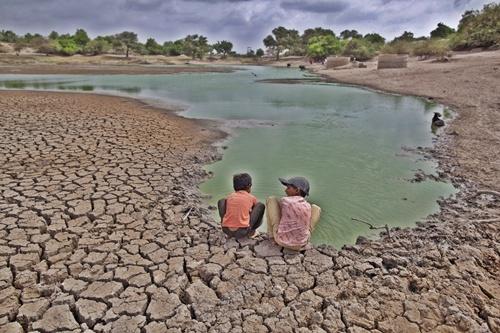
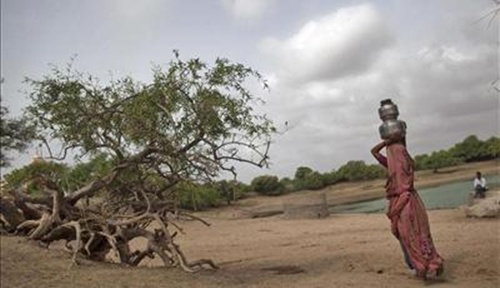

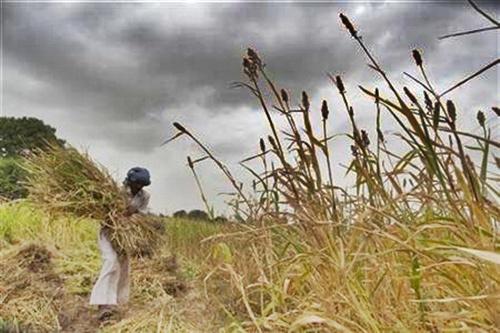

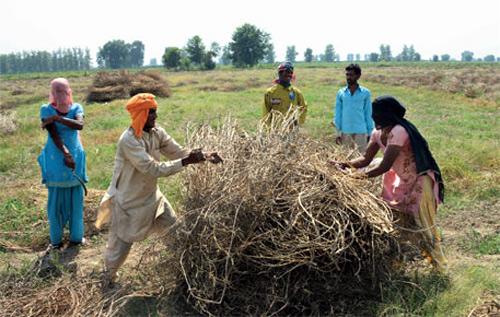
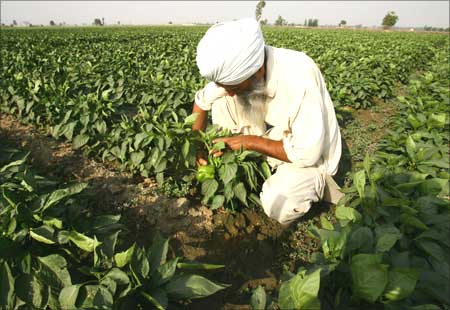
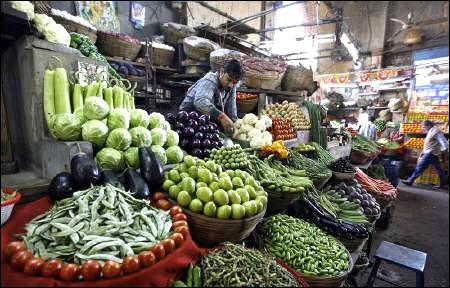
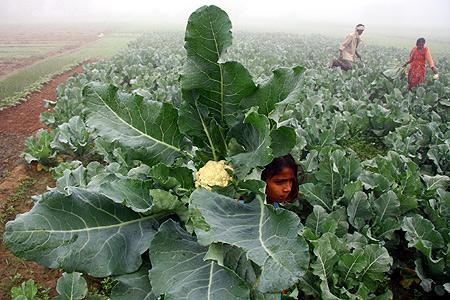
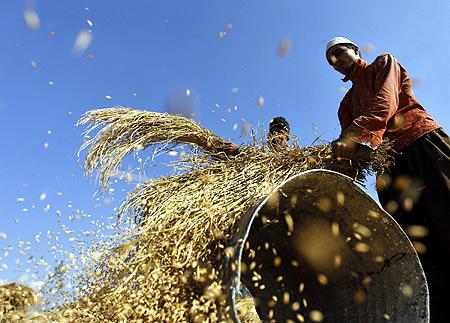
article